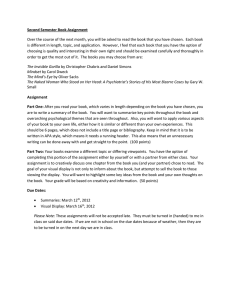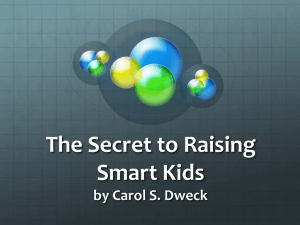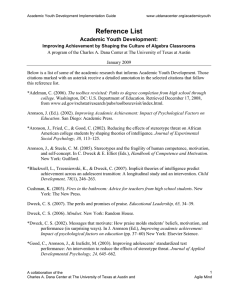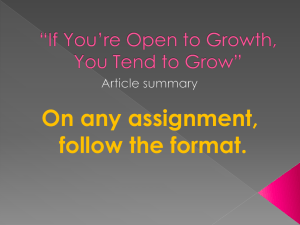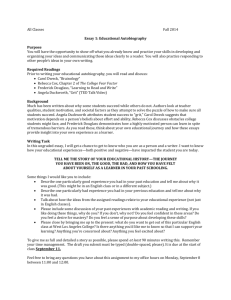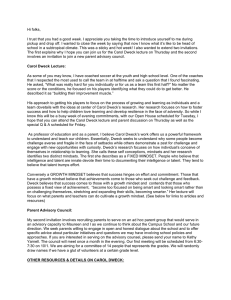Dear Campus School Families:
advertisement
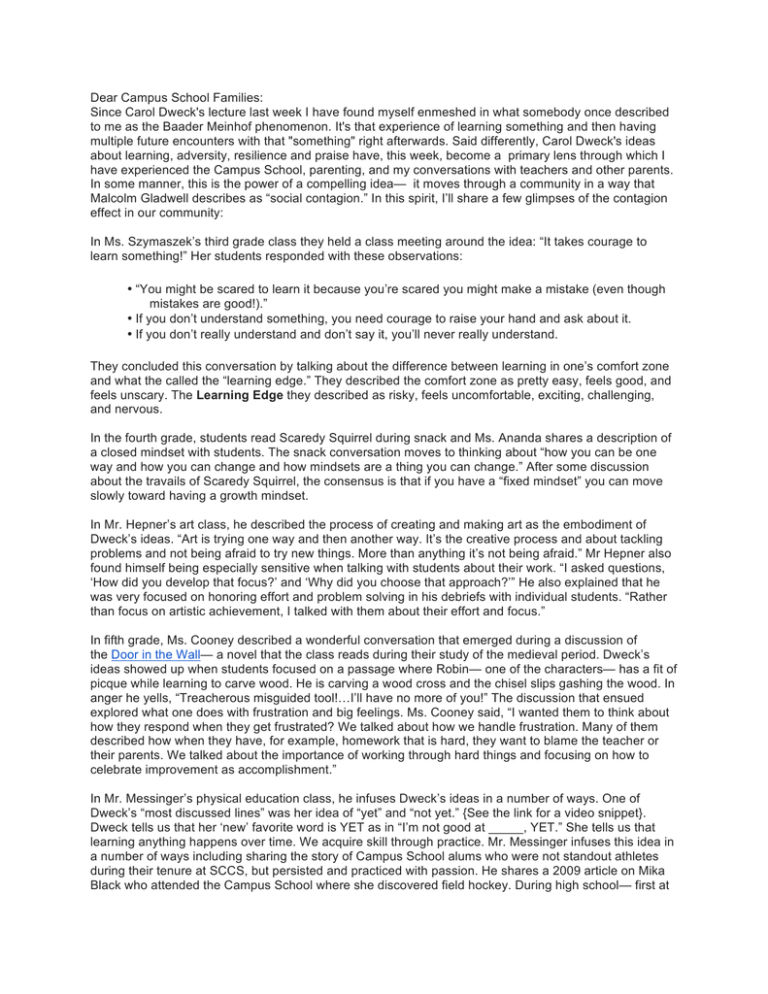
Dear Campus School Families:
Since Carol Dweck's lecture last week I have found myself enmeshed in what somebody once described
to me as the Baader Meinhof phenomenon. It's that experience of learning something and then having
multiple future encounters with that "something" right afterwards. Said differently, Carol Dweck's ideas
about learning, adversity, resilience and praise have, this week, become a primary lens through which I
have experienced the Campus School, parenting, and my conversations with teachers and other parents.
In some manner, this is the power of a compelling idea— it moves through a community in a way that
Malcolm Gladwell describes as “social contagion.” In this spirit, I’ll share a few glimpses of the contagion
effect in our community:
In Ms. Szymaszek’s third grade class they held a class meeting around the idea: “It takes courage to
learn something!” Her students responded with these observations:
• “You might be scared to learn it because you’re scared you might make a mistake (even though
mistakes are good!).”
• If you don’t understand something, you need courage to raise your hand and ask about it.
• If you don’t really understand and don’t say it, you’ll never really understand.
They concluded this conversation by talking about the difference between learning in one’s comfort zone
and what the called the “learning edge.” They described the comfort zone as pretty easy, feels good, and
feels unscary. The Learning Edge they described as risky, feels uncomfortable, exciting, challenging,
and nervous.
In the fourth grade, students read Scaredy Squirrel during snack and Ms. Ananda shares a description of
a closed mindset with students. The snack conversation moves to thinking about “how you can be one
way and how you can change and how mindsets are a thing you can change.” After some discussion
about the travails of Scaredy Squirrel, the consensus is that if you have a “fixed mindset” you can move
slowly toward having a growth mindset.
In Mr. Hepner’s art class, he described the process of creating and making art as the embodiment of
Dweck’s ideas. “Art is trying one way and then another way. It’s the creative process and about tackling
problems and not being afraid to try new things. More than anything it’s not being afraid.” Mr Hepner also
found himself being especially sensitive when talking with students about their work. “I asked questions,
‘How did you develop that focus?’ and ‘Why did you choose that approach?’” He also explained that he
was very focused on honoring effort and problem solving in his debriefs with individual students. “Rather
than focus on artistic achievement, I talked with them about their effort and focus.”
In fifth grade, Ms. Cooney described a wonderful conversation that emerged during a discussion of
the Door in the Wall— a novel that the class reads during their study of the medieval period. Dweck’s
ideas showed up when students focused on a passage where Robin— one of the characters— has a fit of
picque while learning to carve wood. He is carving a wood cross and the chisel slips gashing the wood. In
anger he yells, “Treacherous misguided tool!…I’ll have no more of you!” The discussion that ensued
explored what one does with frustration and big feelings. Ms. Cooney said, “I wanted them to think about
how they respond when they get frustrated? We talked about how we handle frustration. Many of them
described how when they have, for example, homework that is hard, they want to blame the teacher or
their parents. We talked about the importance of working through hard things and focusing on how to
celebrate improvement as accomplishment.”
In Mr. Messinger’s physical education class, he infuses Dweck’s ideas in a number of ways. One of
Dweck’s “most discussed lines” was her idea of “yet” and “not yet.” {See the link for a video snippet}.
Dweck tells us that her ‘new’ favorite word is YET as in “I’m not good at _____, YET.” She tells us that
learning anything happens over time. We acquire skill through practice. Mr. Messinger infuses this idea in
a number of ways including sharing the story of Campus School alums who were not standout athletes
during their tenure at SCCS, but persisted and practiced with passion. He shares a 2009 article on Mika
Black who attended the Campus School where she discovered field hockey. During high school— first at
Northampton HS and then Williston she became tenaciously devoted to getting better. She ended up
playing at the u16 Junior Olympics and then getting a Division I scholarship. “I tell students that it doesn’t
matter if you’re ‘good’ now, but if you have passion for the game and love to play you will get better.”
Lastly, I heard from parents how Dweck's ideas about monitoring how we praise success and effort have
shaped what they have noticed with their children. Ellen Carter-- a parent of two Campus School children- conveyed that her encounter with Dweck's ideas has shaped how she thinks about her work as a
counselor at Stoneleigh-Burnham School:
I am finding that this "mindset" perspective is influencing my work at Stoneleigh-Burnham in some
wonderful and surprising ways. I currently work with the middle school students regularly as a group and
our focus often covers such topics as healthy relationships, conflict resolution, moving through conflict to
deepen friendship, building community in the classroom, etc.
This week I began with some thoughts on understanding our approach to our own learning and had some
wonderfully insightful conversations with the students about their "mindsets" and how it impacts their
approach to school, athletics, the arts. I have given them a challenge to begin to monitor their
perspectives/mindsets as they approach this academic year. They seem ready and engaged.
And so there are many other stories, but I also wanted to share several links to articles and essays
derived and inspired by Dweck that have come to my attention
We sent this out earlier in the week, but since then it has been the #1 most emailed story in the NY
Times. Losing is Good for You In my prior email, I sent the first paragraph as the teaser to the article.
Here is the last paragraph:
When children make mistakes, our job should not be to spin those losses into decorated victories.
Instead, our job is to help kids overcome setbacks, to help them see that progress over time is more
important than a particular win or loss, and to help them graciously congratulate the child who succeeded
when they failed. To do that, we need to refuse all the meaningless plastic and tin destined for landfills.
We have to stop letting the Trophy-Industrial Complex run our children’s lives.
This school year, let’s fight for a kid’s right to lose.
Interestingly, in response to my sending the earlier email I received a suggestion to read an article in this
month's Atlantic that takes issue with the glorification of losing. It’s called Losing is the New Winning: How
we came to fetishize failure
While reading that article I came across another one written by a physician and their middle-school
teaching spouse that was intriguing in that it referenced Dweck's ideas:
How Middle School Failures Lead to Medical School Success
Adolescents who develop resilience in the face of middle school failures develop exactly the kind of skills
that will promote success in medical school. Confronted with the rigorous mental and emotional demands
of medical school, they are able to maintain their sense of self-worth, and thrive despite adversity.
These are the students who, years later, say they have been through a lot in medical school but still want
to change the world one patient at a time. By contrast, the students who come to medical school in a vain
effort to earn their parents' approval by earning another 4.0 average and a six-figure salary struggle with
the constant critiques and the punishing hours.
So- as you can see the idea contagion of Dweck has taken hold in the Campus School and beyond.
Have a great weekend and hope everybody finds some time on both the “comfort zone” and the “learning
edge.”
Sincerely,
Sam
